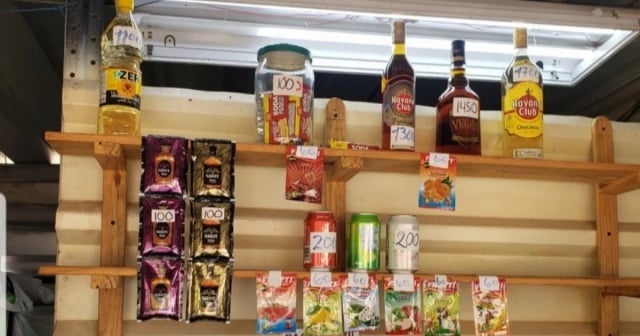Former spy Ramón Labañino Salazar, one of the so-called “five heroes” of the Red Avispa, gave a conference in Spain in which he categorically stated that “the Mipymes in Cuba are here to strengthen socialism.”
Invited by the State Movement of Solidarity with Cuba (MESC), a Spanish group of more than 50 associations and collectives of friendship and solidarity with the communist regime of Havana, Labañino Salazar reiterated the message emphasized by the rulers who approved the creation of the "new economic actors."
Under the title "Economic Situation in Cuba. Perspectives," the current vice president of the National Association of Economists and Accountants of Cuba presented the economic doctrine of the Cuban regime, according to which – in the words of the ousted Minister of Economy and Planning, Alejandro Gil Fernández – "there is a single socialist business system in Cuba."
Before an audience made up of supporters of the regime, Labañino Salazar spoke on October 6 in Málaga (autonomous community of Andalusia) to clarify what the regime in Havana expects from private entrepreneurs that emerged in September 2021 amid the failed measures aimed at achieving the "perfection of the economic model."
"Micro, Small and Medium Enterprises (Mipymes) in Cuba are qualitatively different from Mipymes in other parts of the world because Mipymes in Cuba are aimed at responding to our socialism, to our conditions," asserted Labañino Salazar during his lecture held at the Inturjoven Hostel in the Málaga town of Torremolinos.
Labañino Salazar, whose daughter (Lizbeth Labañino) was pursuing higher studies in April 2023 at the International University of Andalusia (UNIA) in Huelva, had no qualms in acknowledging that "all the companies in the world are created to make profits," but not in the case of Cuba.
"In Cuba, the conception that we defend is that the Mipymes are to complement the state-owned socialist enterprise, so that the state-owned socialist enterprise can be more efficient, and so that there can be productive linkages that allow us to advance," explained the "opinion leader" of the Cuban regime.
His speech is part of the official narrative that the dictatorship intends to consolidate from the so-called "Palace of the Revolution," and which comes from the mouths of prominent figures of the government, its satellites, and agents of influence.
The chorus of voices from the Cuban regime against the Mipymes
One of them, Aleida Guevara March, the always controversial daughter of Che, attacked the Mipymes in mid-May and demanded greater vigilance from the Committees for the Defense of the Revolution - neighborhood organizations dedicated to reporting and "revolutionary surveillance," known as CDR - considering them a potential danger to national security.
In an interview with the Italian portal Ilfattoquotidiano, the spokesperson for the Castro regime stated that "the Mipymes pose risks to security because they can facilitate the entry of drugs or other illegal goods into the country, so it is necessary to intensify the controls by the CDR over what happens in Cuba."
Two months later, Guevara March returned to the charge and pointed out that the Mipymes were not fulfilling their initial mission of producing and criticized Cuban entrepreneurs for seeking profits through the importation of goods.
"As private small businesses emerged, these companies have the privilege that the state does not have; they are not as pressured by the blockade and therefore can import a lot of things. Initially, all these companies were created with the goal of producing, but many have become importers, so they import at black market prices, and the worker cannot compete with that," he argued.
As a solution to this "unexpected consequence" of the market, which she defined as a "serious economic problem," the privileged daughter of Che - belonging to the powerful caste of the regime - proposed that Mipymes stop importing, "since after all, during the special period we all had needs, we had shortages, but it was fair."
The regime's concern about the rise of private entrepreneurs and their economic decisions was once again evident in mid-September, when Cuban leader Miguel Díaz-Canel called for efficiency in recruiting workers from private Mipymes to join the ranks of the only recognized political party in Cuba, the Communist Party.
"We must be able to create grassroots structures within them as well, both for the Party and for the UJC, with appropriate growth and a greater political connection of those workers," said the also first secretary of the Communist Party of Cuba (PCC).
The regime's strategy of maintaining centralized control over key sectors of the economy became evident in late August with the enactment of Decree 107, which established new restrictions for micro, small, and medium private enterprises, as well as for non-agricultural cooperatives and self-employed workers, identifying a total of 125 activities that the so-called "new economic actors" are not authorized to engage in.
"We always reaffirm that in the country there is a single business system, which aims to produce goods and services to meet the demands of the population and support economic and social growth," said Gil Fernández at the end of July 2023.
According to the former minister –who remains in an unknown location following his arrest in early February of this year–, in Cuba it is the state-owned company that must "generate the greatest dynamic of economic growth."
"It is a unique business system with various forms of management and various forms of ownership, but with a single objective: one socialist system," Gil Fernández maintained half a year before his dismissal, which was signed by his doctoral thesis supervisor, the ruler Díaz-Canel, who stated that "there will be no tolerance for a lack of ethics" after ordering an investigation into his protégé for corruption.
What do you think?
COMMENTFiled under:

